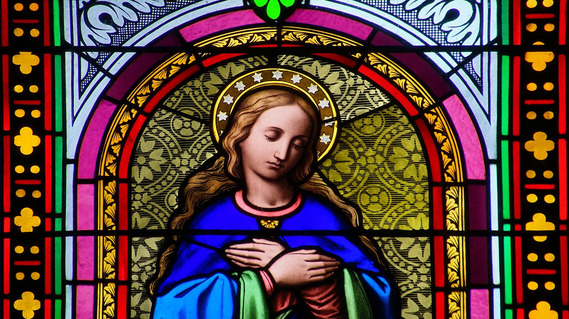Why homage?
I concede that we have little historical information about Mary's nativity. Only an apocryphal gospel of the second century offers any information. Consequently, it would be difficult to assign readings which are, practically speaking, non-existent. More important, however, my reflection lead to an awareness of two distinct, but related, issues that concern spiritual growth. The development of that reflection lead me to ask the question: Why should we pay Mary special homage in any form?
Reflection - Simply Saints
http://www.usccb.org/bible/readings/090816.cfm
1 Mic 5:1-4a
Rom 8:28-30
Mt 1:1-16, 18-23
My customary practice is to begin my preparations for these reflections with prayer followed by a reading of those Scriptures assigned to the day. Today's feast is that of the Nativity of the Blessed Virgin Mary. For whatever reason, the church designated more than the usual two selections. The lector was offered the opportunity to pick one from two possibilities for the first reading as well as one from two for the second. As I summarize each one, keep in mind today's feast: the Birthday of Mary.
The first choice offered for the first reading is from the Old Testament prophet, Micah. You may be familiar with this particular passage as it is commonly read in the Christmas season. When the magi approach King Herod and explain their journey to find the newborn King, he consults with the chief priests and scribes to determine where the Christ was to be born. Their reply quotes from these very verses in the Book of Micah: "You, Bethlehem-Ephrathah, from you shall come forth for me one who is to be ruler in Israel." The text briefly continues with a description of the marvelous reign of this promised ruler.
The second passage offered is from Paul's letter to the Romans. These verses speak of those predestined by God who are, by virtue of their predestination, "to be conformed to the image of his Son, so that He might be the firstborn among many brothers."
The first selection offered for the gospel reading is from Matthew. It traces the ancestry of Jesus beginning with Abraham and continuing down to "Jacob the father of Joseph, the husband of Mary." The passage continues, telling of Joseph's response when he discovered that Mary was "with child," and how the Angel appeared to him in a dream saying:
"do not be afraid to take Mary your wife into your home; for it is through the Holy Spirit that this child has been conceived in her."
The second choice for the Gospel reading is simply a shortened version of the first. The genealogy is omitted, and only the account of Joseph and his dream and the message of the angel are given as the second option.
When I finish reading all four I was puzzled. There are four texts suggested and not one mentions the nativity of Mary. Further, when Mary is mentioned at all it is almost incidentally as if the information is necessary to avoid misunderstanding. Review with me once more.
In the first option for the first reading, Mary is mentioned only indirectly. "Therefore the Lord will give them up, until the time when she who is to give birth has borne." In other words, the Chosen People will remain under foreign domination until the time when the promised King, the Christ, is born. The verses are about the promised savior, not His mother.
The second passage, the one from Romans, does not speak of Mary at all, either directly or indirectly. Granted that we can assume her to be among those predestined to be 'conformed'; but no reading of the text would lead to an interpretation that it is about Mary. In fact, it is not about Mary except insofar as she is part of the predestined group.
The Gospel options mystify even more.
The genealogy is that of Joseph. Mary is mentioned only incidentally as if to insure that there's no confusion about the Joseph whose ancestry is here detailed.
The second selection is simply the final few verses of the first. Once again, Mary is an aside. Joseph is the one with the problem. Joseph is the one who is visited by the Angel of the Lord. Joseph is the one given information and direction.
I concede that we have little historical information about Mary's nativity. Only an apocryphal gospel of the second century offers any information. Consequently, it would be difficult to assign readings which are, practically speaking, non-existent. More important, however, my reflection lead to an awareness of two distinct, but related, issues that concern spiritual growth. The development of that reflection lead me to ask the question: Why should we pay Mary special homage in any form?
The very selection of these Scripture passages for reading on the feast of Mary's nativity is indicative of a lack of solid information. However, what made Mary great was not an intentional obscurity, but an obscurity that results from directing all attention somewhere else. Mary's life was focused on God. In the two thousand years that have elapsed since her life, even her appearances at places like Fatima or Lourdes or Guadalupe or Medjugorje have not been to call attention to herself, but to direct all attention toward her Son, Jesus. This is nothing new; but consider with me.
- Mary didn't do anything great.
- She didn't build a holy religious empire
- She didn't correct the course of the existing empire of Rome.
- She didn't govern the church during a tumultuous period in history.
- She didn't minister to the refuse on the streets of Jerusalem or Calcutta
- She didn't establish a religious order
- She didn't become a Doctor of the Church.
- She wasn't a martyr preaching the gospel in foreign lands
- She was not the origin of her Son
- It was certainly not her idea that Jesus should be conceived and born.
- She can't even take credit for the person that he was.
Granted that Mary was blessed in a most unusual way, being chosen to be the mother of God's Son. Granted that she herself was free of original sin. Granted that she was blessed yet again at the end of her life when Jesus did not allow her body to undergo corruption. But these blessings make her special; they do not make her a saint.
What I recognized in becoming aware of the fact that the Scriptures refer so minimally to her, is the simplicity of being a saint. Sainthood begins and ends with a life of praise to God. It is spoken in a three letter word: "Yes!" It does not require a life of notable achievement, nor does it require heroic activity. It involves no special talents nor is it likely to be recognized with awards or degrees. It is beyond the reach of none and readily available to all. Being a saint is among the simplest things a person can achieve, because it requires nothing more than living a life of praise.
Jesus put it this way in the Sermon on the Mount: "Let your light so shine before men, that they may see your good works and give glory to your Father who is in heaven." (Matthew 5:16) And what is this light that I am given? It is my life!
When I was young, it did not take me long to realize that neither age nor maturity nor education would enable me to develop into the next Batman or Superman or even Captain Marvel. Something else was clearly on the agenda for my future. My movie heroes were more down to earth. Knights in shining armor were passé, cowboys were a romanticized feature of a history riding off into the sunset, and moon landings were likely prospects only in the virtual reality of Jules Verne's mind. Of necessity, and just like most everyone else I was destined to settle for something far more mundane. If I had only known, I could have settled much sooner on something far greater.
I am at the apex of God's creation on earth. I am the consciousness of all things that He has made. I am singularly blessed in being able to praise Him in a way that is beyond the magnificence of mountains or the awesomeness of a sunset. I can speak through my life the praise which all creation yearns to voice. I can know God and see him face to face in the person of His Son. Being a saint requires the simplicity of living the life you are given while continually praising the One who gives it. Jesus' mother did that without reservation. Her very obscurity testifies to the fact that she is the greatest of all saints for her life was lived redirecting all praise and glory to the Father.

